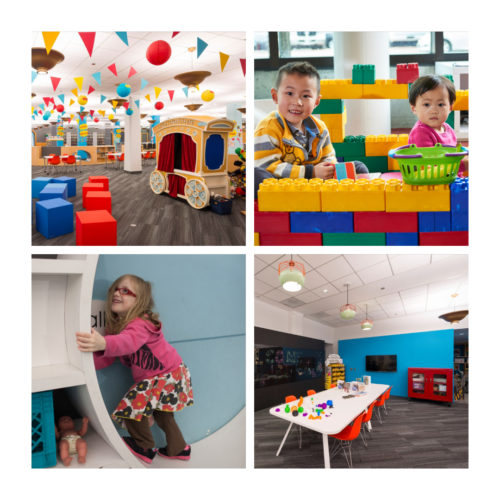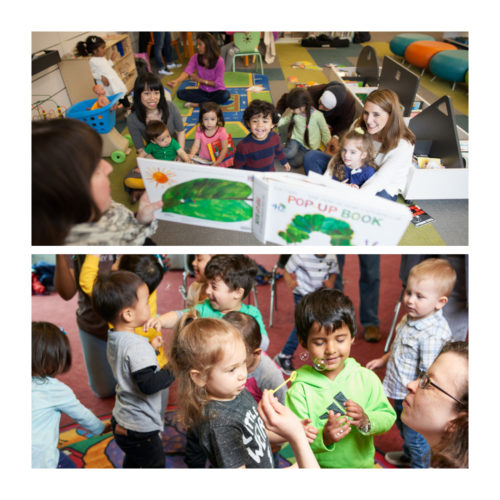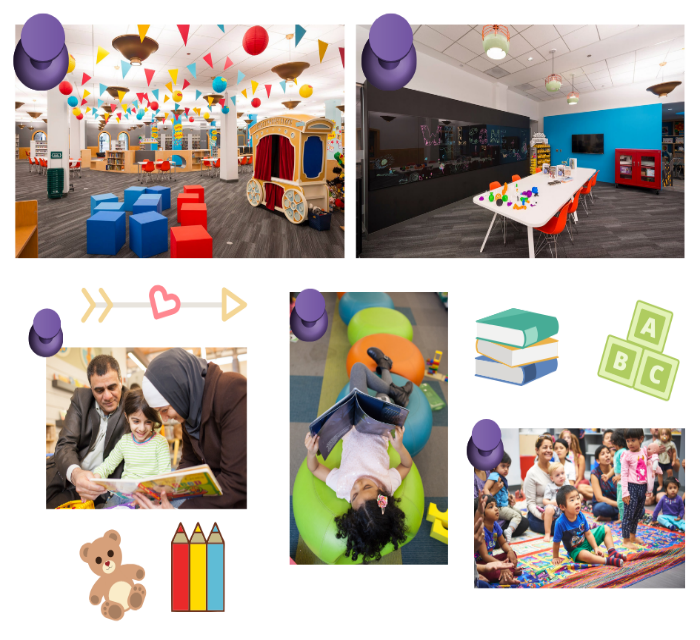A cacophony of sounds greets me – unbridled feats of giggling, footsteps scurrying around, and small voices singing, “Hello, how are you?” – inviting me to the magical world of Chicago Public Library’s Early Learning spaces.


A Place Just for Kids
It might only be a flight of stairs apart from the rest of the library, but children’s early learning spaces within CPL branches seem to be worlds away. Bright lights mimic a clear summer’s day. Blue, red, yellow, and green blocks are scattered around the floor and tabletops. There are as many toys as there are books. In one corner, a mother reads to her little one, carefully pointing out to pictures in every page. Close by, a couple of children play hide-and-seek in their princess crowns and fireman hats. Further down the hall, a father takes a photo of his two-year old putting on an impromptu puppet show.
As a small group of kids run, plastic pizza slices in hand, to the restaurant bus, I realize that what further separates the Early Learning spaces from the rest of the library is the openness of the area and the freedom that comes with it. Here, children are free to pick up whatever toy piques their curiosity. They can run from one side of the library to another, bringing a book (or two) as they sweep by. Kids are encouraged to make friends as they color, read, and play together. And the best part? Children and families can enjoy the spaces for free. Accessibility for all has always been a guiding principle for Chicago Public Library and that begins with our youngest learners.
“There is a place for every child here,” Jess, the children’s librarian shares. And while it may seem chaotic at first glance, there is a method to the playful madness. Early Learning spaces are thoughtfully designed to cultivate the five pillars of early literacy: talk, sing, read, write, and play. Every element in the space is a learning tool – building blocks, kitchen set, and cardboard houses. Because children learn through play, whatever activity they choose, learning takes place.
There is Always Time for a Good Story
Around 9:30 in the morning, kids with their chaperones in tow, excitedly enter a glass-paneled room, taking their shoes off as fast as they can. Ms. Andy, a resident storyteller, welcomes every child with a high-five then leads them onto a rainbow mat in the center of the room. As kids play, adults begin to chat, their conversations seemingly a continuation of previous ones. “Is she feeling better already?” “Wow! He can walk; wasn’t he just crawling the last time?” There is a sense of comfort and familiarity here – a community of friends and neighbors.
At exactly 9:45, Storytime begins. On cue, everyone sings “Hello” in English, French, and Spanish – complete with clapping, thumping, and eager waving. It is not lost on me that most of the participants know the song by heart (as it turns out, the class has been learning the “Hello” song for a week and most are regular attendees.) After the song, Ms. Andy guides the class to sitting position– moms, dads, grandmas, and caregivers on the floor with their children comfortably on their laps.
Ms. Andy is animated, punctuating each word with energy and enthusiasm. As she reads and sings, she walks to every child creating a special connection through eye contact. It’s amazing how kids respond to Andy’s engagement. They wave, smile, even mirror Ms. Andy’s gestures. “This is such a crucial stage in development,” she explains. “The synapses in their brain are firing, absorbing anything and everything they see, hear, and feel. That’s why as early as 6 months, we introduce them to words, colors, animals and other basic concepts. At the same time, we also want to create a positive environment for children. We want them to associate learning as a joyful experience. We want to give them the space to explore and we enable their curiosity,” Ms. Andy continues.
What is more surprising, perhaps, is how Storytime is as enriching for the adults in the room as it is for their little ones. Ms. Andy models effective strategies to integrate learning through play such as associating words with specific body movements, following the leader, and simply enjoying time with your children. She also emphasizes for adults to encourage independent behavior. Allow your child to run freely. Let them initiate games. Let them pick up their toys and bring them back to the toy box. She also guides caregivers on how to practice the five pillars of literacy at home. “Story time and other Early Learning programs like Play Group, Terrific 2’s and 3’s, and Tummy time are all designed to support parents/caregivers in preparing their children for speaking and reading success,” Ms. Andy shares.
After 25 minutes of singing, dancing, and playing, Ms. Andy asks, “Where are my little helpers?” Eagerly, children stand and put the toys in the basket signaling the end of today’s session. Some walk directly to their baby carts and get ready to head home. Others head back to the larger space to read and play some more. There are some who stay behind to ask Ms. Andy for an encore performance. Of course, she happily obliges. She is not one to turn away a child thirsty for knowledge.
As I’m getting ready to head out myself, a mom carrying a chubby-cheeked baby boy says, “This is such a great place! I love bringing Victor for the activities…and it’s all free!”
For many parents and caregivers, there are few places to go (especially during the frosty winter time) where you can let your child play, socialize, and learn that does not break the budget. Luckily, Chicago Public Library has families covered with their Early Learning spaces. If you haven’t been to one yet, plan a visit to your local branch.
Early Learning is a free and accessible resource that supports Chicago Public Library’s youngest learners during the most formative years of their lives – preparing them for reading and speaking success. Early Learning is made possible thanks to Exelon, The Barker Welfare Foundation, PNC, The Brinson Foundation, TriBraining, the Warshawsky Family Philanthropic Fund and other generous donors to the Chicago Public Library Foundation. If you are interested in supporting Chicago’s children, you too can make a gift that goes a long way.


